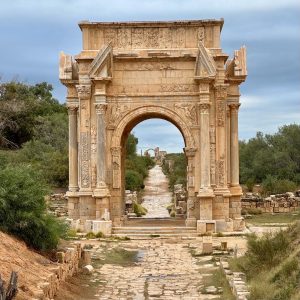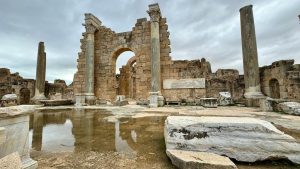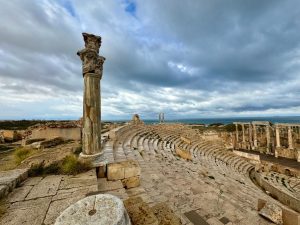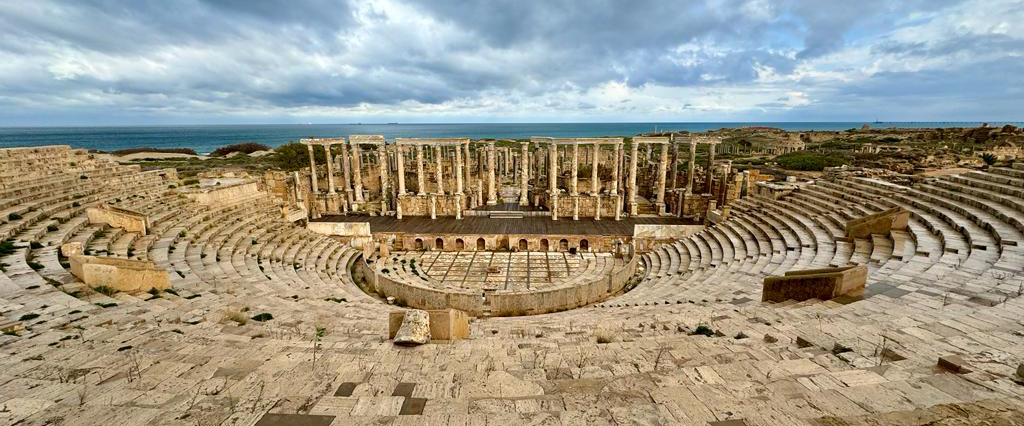Archaeological Site of Leptis Magna
Leptis Magna or Lepcis Magna is a World Heritage site on the Mediterranean coast of North Africa in the Tripolitania region of Libya. Leptis (originally spelled Lepcis and often known locally in Arabic as Lubdah) was once the largest and greatest Roman city in Africa, unlike Sabratha, Leptis Magna was constructed of sturdy limestone that left it more resistant to earthquakes and the ravages of time, the ruins are wonderfully well preserved and it’s that rare ancient city where sufficient traces remain to imagine the city in its heyday.
But the charms of Leptis are not restricted to its state of preservation. So large is its scope that it remains a showcase of Roman town planning, with streets following an ordered pattern. Above all, it is a testament to the extravagance of ancient Rome with abundant examples of lavish decoration, grand buildings of monumental stature, indulgent bath complexes and forums for entertainment at the centre of public life. It must have been a great place to live.
History
Leptis Magna is believed to date from the 7th century BC. It began as a peripheral trading port populated by Phoenicians fleeing from conflict in Tyre (present-day Lebanon) as well as Punic settlers from Carthage (in Tunisia). Other than the Old Forum, little remains from this city, which lasted for up to 500 years, but it was a modest settlement with none of the ordered urban design of the Roman era.
When Carthage fell in 146 BC, Leptis Magna nominally came under the wing of the Numidian kingdom. The shift towards the Roman sphere of influence began in 111 BC, when the city’s inhabitants concluded a treaty of alliance and friendship with Rome and large numbers of Roman settlers began to arrive.
Under Emperor Augustus (r 27 BC-AD 14) Leptis status as an important Roman city of emerging power began to take shape. The city minted its own coins, the town was laid out in the Roman style and then adorned with monuments of grandeur. It soon became one of the leading ports in Africa, an entrepôt for the trade in exotic animals that were so essential to the entertainments that so defined ancient Rome. It also fell under the spell of a wealthy Roman elite with grand visions and money to burn. One local aristocrat. Annobal Tapapius Rufus, was responsible for the construction of the market (8 BC) and theatre (AD2), giving Leptis the essential touchstones of a Roman city of significance.
The grand, monumental city of Leptis had begun to become a reality.
After backing the wrong side in one of Rome’s internecine spats, Leptis momentarily lost its status as a friendly city and ally of Rome and was punished for good measure by an annual tax of between one and three million litres of olive oil. The city’s stability was further threatened by the constant threat of invasion by the hostile tribes of the interior. In AD 69 the city was overrun by the Garamantes people of the Sahara who had been called in to assist Oea in its dispute with Leptis. Despite these momentary difficulties, Leptis emerged as a prosperous city that owed its wealth to agriculture (especially olives) and trade from trans Saharan caravans and seagoing trade, particularly in exporting live animals to Rome. Successive Roman emperors continued to decorate the city with exceptionally rich public buildings. In the time of Hadrian (r AD 117–38)
Must see attractions
- ARCH OF SEPTIMIUS SEVERUS
- HADRIANIC BATHS
- GREAT COLONNADED STREET
- NYMPHAEUM
- SEVERAN FORUM
- BYZANTINE GATE
- PORT
- MONUMENTAL ARCHES
- SEVERAN BASILICA
- OLD FORUM
- CHALCIDICUM
- MARKET
- THEATRE
- LEPTIS MUSEUM
- CIRCUS
- AMPHITHEATRE






